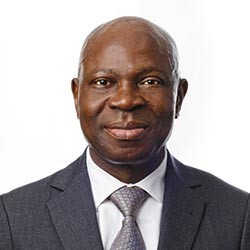Statement by Gilbert F. Houngbo, President of IFAD, to the Foreign Affairs Committee of the Italian Parliament
IFAD Asset Request Portlet
Asset Publisher
Statement by Gilbert F. Houngbo, President of IFAD, to the Foreign Affairs Committee of the Italian Parliament
Location: Rome, Italy
18 November 2020Excellencies,
Honorable President Fassino,
Honorable Members of the Commission of Foreign Affairs and Agriculture,
Honorable Deputies,
Ladies and Gentlemen,
Thank you for inviting the International Fund for Agricultural Development (IFAD) to join this important discussion on redoubling efforts to end global hunger and malnutrition by 2030.
I am very pleased to see some of you again after your visit to IFAD earlier this year. I particularly appreciate your willingness to hold this consultation at a time when the Italian government faces so many important demands.
Unfortunately, the need is critical. We cannot afford to neglect poverty and hunger. We know that hunger is both a result of conflict, and a cause of conflict. We ignore it at our peril.
Even before COVID-19, the world was not on track to meet the first Global Goal to end extreme poverty, nor the second, to achieve zero hunger, by 2030. And we have all seen that the projections are for greater poverty, hunger, and economic disruption because of the pandemic.
On behalf of all IFAD staff, I would like to thank the Italian authorities for their ongoing partnership and support – including their guidance during this unexpected coronavirus emergency.
I would also like to extend my thanks to the Ministry of Foreign Affairs and International Cooperation as well as the Ministry of Finance; both have been IFAD’s partners in development for more than 40 years.
Ladies and Gentlemen,
As some of you may know, IFAD is the youngest of the three Rome-based United Nations agencies. It was created in 1977, in response to devastating droughts and famines and soaring food prices.
IFAD’s mandate has always been very specific – to provide financing to the poorest of rural communities in order to build resilience and end hunger and poverty through farming and non-farming activities.
While FAO focuses on food and agricultural research, norms-setting, knowledge-sharing and policy; while WFP focuses on emergency nutritious food aid and assistance; all – 100 per cent – of IFAD’s work is operations on the ground, investing in development initiatives.
Today, 59 per cent of our core resources goes to Sub-Saharan Africa and in the future, we are committed to allocating 100 per cent of those resources exclusively in low- and lower-middle-income countries.
Also, unlike FAO or WFP, IFAD is a financial institution – like the World Bank or the AfDB, ASDB, IADB, etc.
IFAD provides concessional sovereign loans to borrowing countries that benefit rural communities. In fact, we are the only specialized financial institution that is fully dedicated to rural people. We do not do anything outside rural communities. At the end of 2019, we had a portfolio of US$7.5 billion across 206 ongoing projects in 90 countries, reaching more than 130 million people – half of them women and 20 per cent of them youth.
We believe in documenting results. Our impact assessments show that each year, IFAD’s investments raise the production of 15 million small-scale producers and improve the resilience of 9 million project participants.
IFAD has committed to ensure that 50 per cent of projects approved in our current funding cycle are nutrition-sensitive. Our other mainstreaming themes are climate, gender, youth, biodiversity and people with disabilities.
Given the reflows and IFAD’s ability to act as an assembler of finance, every dollar contributed by your taxpayers to IFAD is transformed into US$8 dollars for development projects. For our partners such as Italy, this means that their individual contributions through IFAD have a multiplier effect in ensuring food security and reducing poverty.
And now, we have very recently received an AA+ credit rating by Fitch, which makes us the first UN Fund to receive such important recognition.
Ladies and gentlemen,
IFAD is deeply concerned about the impact of the COVID-19 crisis on its Member States and the millions of rural youth, women and men we serve.
For this reason, we are repurposing ongoing projects to address the immediate impacts of the crisis. So far, we have approved US$142 million of repurposed funding in 32 countries. Much of this is to procure and distribute seeds and fertilizer to subsistence farmers.
In addition, we have launched a Rural Poor Stimulus Facility. This multi-donor facility is an immediate response to the current crisis that feeds into IFAD’s long-term development objectives and financing instruments. In its first two months, we approved US$30 million for 41 projects that respond directly to the COVID-19 emergency.
The proposals approved so far are expected to reach around 1.5 million project participants. Half of this financing has gone to lower-income countries, and just under half has gone to countries in fragile situations.
Excellencies,
Italy has been a special partner for IFAD since our foundation. It has been a generous host – not only to IFAD but to the other Rome-based and Italian-based agencies. But more than that, Italy and IFAD recognize the importance of small-scale farming and share a commitment to fighting poverty and hunger through sustainable, inclusive and fair rural and agricultural development.
IFAD looks forward to Italy’s G20 presidency and to COP26. We stand ready to support Italy’s efforts to improve food systems and create a world where no one is left behind.
Thank you.
